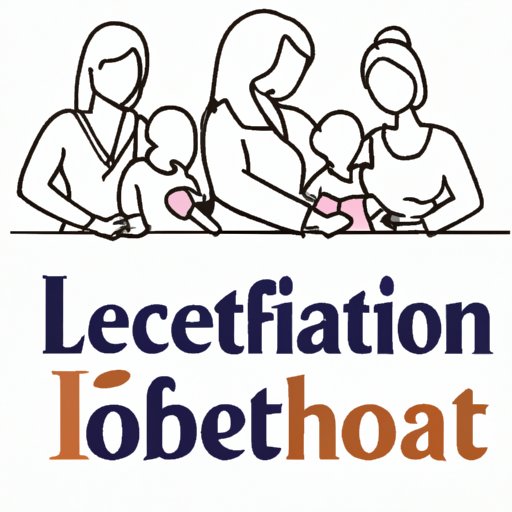
Introduction
Are you passionate about breastfeeding and lactation? Are you interested in helping new moms and babies experience a healthy nursing relationship? If so, you might consider becoming a lactation consultant. This rewarding career allows you to support and educate families, promote public health, and enjoy a flexible schedule. In this article, we’ll explore everything you need to know to become a lactation consultant, from education to cultural competency to business building.
Interview with an established lactation consultant
To get started, we interviewed a lactation consultant with over ten years of experience, who works in a major hospital in the Midwest. She revealed that the most important steps to becoming a lactation consultant are obtaining the required education, completing clinical hours, and passing a rigorous certification exam. In addition, she emphasized the importance of empathetic listening, clear communication, and flexibility in working with diverse families. She acknowledged that the job can be challenging at times, as it involves working odd hours, dealing with stressed-out clients, and balancing competing demands. However, she also stressed that the rewards of seeing babies thrive and mothers blossom make it all worth it.
Step-by-step guide to becoming a lactation consultant
If you’re considering becoming a lactation consultant, the following steps will guide you along the way:
- Acquire the necessary education. Most lactation consultant certification programs require completion of specific courses related to human anatomy, infant growth and development, and breastfeeding. These courses can be taken online or in-person through a variety of educational institutions. Look for programs that are accredited by a recognized certifying body, like the International Board of Lactation Consultant Examiners (IBLCE).
- Accrue clinical hours. In addition to coursework, most certification organizations require practical experience in the form of supervised clinical hours. These hours must be completed under the supervision of a certified lactation consultant or another qualified healthcare professional. You may be able to gain clinical experience by volunteering, interning, or working in a healthcare setting, such as a hospital or clinic.
- Pass the certification exam. Once you’ve completed your coursework and clinical hours, you’ll need to pass a rigorous certification exam. The IBLCE exam, for example, consists of 175 multiple-choice questions covering a broad range of lactation topics. Passing the exam demonstrates your mastery of the latest practices and research in lactation consulting.
Personal stories from lactation consultants’ journeys to becoming certified
To give you a sense of what it takes to become a certified lactation consultant, we spoke with several individuals who recently went through the certification process. They shared their individual journeys, including challenges they faced, tips for success, and moments of triumph. Some of their insights included the importance of perseverance, self-care, and mentorship.
List of resources for aspiring lactation consultants
If you’re looking for additional resources to help you along your journey to becoming a lactation consultant, these organizations and materials may be of use:
- International Board of Lactation Consultant Examiners (IBLCE): This is the certifying body for lactation consultants worldwide. Their website offers information on certification requirements, exam preparation, and continuing education.
- Academy of Lactation Policy and Practice (ALPP): This organization offers a variety of educational programs for aspiring and current lactation consultants. They provide online lectures, webinars, and conferences on various topics related to lactation consulting.
- La Leche League International: This non-profit organization offers free breastfeeding and parenting support to families through local community groups and a variety of online resources.
Cultural competency in lactation consulting
One important aspect of lactation consulting is being able to work effectively with families from diverse cultural backgrounds. This requires an awareness and understanding of different cultural norms and practices related to breastfeeding. To develop cultural competency, lactation consultants can do the following:
- Take courses or workshops on cultural awareness and sensitivity
- Actively seek out and listen to feedback from clients of different backgrounds
- Develop a respectful, non-judgmental approach to working with clients from all cultures
Types of lactation consulting careers
As a lactation consultant, you have a variety of career paths available to you, depending on your interests and goals. Some common career options include:
- Hospital-based lactation consultant: Working in a hospital or healthcare setting, you would support new mothers and babies in the first few days and weeks after birth. You may also teach breastfeeding classes and train other healthcare providers on best practices.
- Private practice lactation consultant: Instead of working for a hospital or agency, you could start your own consultancy, seeing clients in their homes or your own office. This option offers greater flexibility and potentially higher income, but requires greater business skills.
- Non-profit lactation consultant: You could work for a non-profit organization, such as La Leche League, providing free or low-cost breastfeeding support to underserved communities.
Tips for starting a successful lactation consulting business
If you decide to start your own lactation consulting business, there are several key steps you can take to ensure success:
- Build a client base. Reach out to local healthcare providers, parenting groups, and online communities to spread the word about your services. Offer free consultations or workshops to attract new clients.
- Set rates and manage finances carefully. Determine how much to charge for your services based on market research and your own expenses. Keep careful records of your income and expenses, and seek out professional advice if needed.
Conclusion
Becoming a lactation consultant can be a rewarding and fulfilling career choice that allows you to make a real difference in the lives of new mothers and babies. By following the steps outlined in this article, you can gain the education, training, and certification required to join this growing field. Remember to stay curious, empathetic, and culturally competent, and to seek out support and mentorship along the way. By doing so, you’ll be well on your way to a career as a certified lactation consultant.





